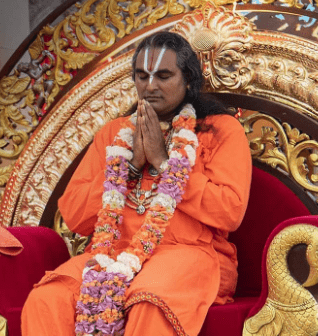The Tool to Calm Your Mind
Apart from yoga, meditation is widely used but only a few people really know what it means to practice. At its core, meditation means to focus on something so intensely that it becomes the only thing that exists. There are many ways to meditate but one of the easiest methods is through japa - the constant repetition of the Divine Names.
To truly meditate one should first master japa, then only one will be able to experience true meditation. - Paramahamsa Vishwananda.
In fact, japa is such a powerful practice that most religions and spirituality practice some form of it. In Christianity, they pray the rosary. In Islam, practitioners perform dhikr on a misbaha. And in Hinduism, we chant japa on a mala.
Now, while japa is often performed on a set of prayer beads, the beads themselves are not required. We’ll get into how to practice japa a bit later, but for now, what’s important to understand is the beauty of the Divine Names as a mantra meditation and how they help you calm your mind and subsequently open your heart.
What is a Mantra?
The word mantra has two translations. Firstly, as protection from and for the mind. Mantras protect the mind from any negativity outside and from any negativity already inside. Secondly, it means ‘heart prayer’. It is a prayer from the heart. It is typically, but not always, made up of a set of Divine Names. As you focus on the mantra and chant it, it influences your mind.
Think of the mind like a sponge. It will absorb anything and everything you put into it, influencing your thoughts, belief systems, and behaviours. When you focus on negative things, your mind becomes a less than pleasant place to live. When you focus on positive things, your mind becomes a more pleasant place to live. Following that logic, when you focus on a mantra or the Divine Names, your mind will be equally influenced by it to become Divine.
When the Divine Names are always on your lips, there will be no time for you to think of negative things. - Paramahamsa Vishwananda
It is said the Name of God is more merciful than God Himself. There are almost no rules on how to interact with and relate to the Name. We can even chant it in the bathroom.
When you chant the Divine Names, it not only calms your mind but also opens your heart to Divine Love within yourself and in the world around you. As that happens, the calming mind becomes a side effect, a singular benefit of a much greater journey. There really is no limit as to what the Divine Names can do.
Developing a mantra meditation practice then begins with picking your mantra.

Calming Your Mind with Mantra Meditation
While there are countless mantras, we suggest ‘om namo narayanaya’. This particular mantra will help calm the judging mind, help open your heart to love, and carries the mercy of the Divine.
Once you have your mantra, it's as simple as chanting as much as you can. You can chant out loud, whispering or silently. You can chant while in seated meditation or on a walk or even while you're going about your day. This mantra meditation allows you to turn any activity into one of conscious awareness and focus.
Out Loud
Chanting out loud is exactly what it sounds like. You can chant as loud or not loud as you want. This is a great way to chant when your mind is really active and hard to control. It helps bring your focus from the outside to the inside and prepares you to meditate. As a bonus, when you chant out loud it also serves everything around you too as they get to hear the Divine Name!
Pro tip: Chant louder than your mind.
Whispering
Again, it’s exactly what it sounds like. You can whisper the Divine Names. When you practice this way, it helps you move your focus more inward and continues to prepare you to meditate.
Pro tip: Whisper chanting is a great way to lull your little ones to sleep and give them the benefit of the mantra too!
Silently
Chant silently to yourself. This method of chanting is entirely inward. This is great for when your mind is relatively calm already and for when you're ready to sit down and meditate.
It’s really that simple. You just chant. Out loud, quietly, or to yourself. Absolutely, you can chant in seated meditation or while out and about. Divine Names are always accessible to you, no matter where you are or what you are doing. Chant while you’re cooking or cleaning or going to work. Chant while you’re showering or running or enjoying a long walk. Chant on the train or the plane or in the car, and… so, you get the point.
If you ask which is the ‘best’ method - the answer will always be, ‘it depends.’ It depends on which method allows you to focus on the Divine Names the best.
There really aren’t so many rules. In fact, there are only two rules when it comes to mantra meditation. (Well, three if we are technical about it.)
- Do not chant while watching TV or playing video games. You won’t be able to keep your focus on the mantra while doing those things.
- Enjoy it!
- Three is more of a guideline. Japa is a very powerful practice that can amplify your emotions. So it’s typically better to refrain from chanting when you are angry because it can increase your anger. Feel free to experiment with this one. If you try chanting when you’re angry and it gets worse or stays the same, stop and try a different coping mechanism. If it does get better, keep chanting!
Creating Your Daily Mantra Meditation Practice
Your practice is entirely up to you. It’s your meditation and your practice. Here are a few tips to help get you started:
- Find the Empty Moments - Empty moments are the points in your day when you are performing a rather mindless task. That could be your coffee or lunch break, the walk to the bathroom, your shower, even the commute to work. Use these times to chant.
- Dedicate a set time in your schedule to practice. Even if it’s just five minutes every day, having a set time that’s just for mantra meditation will help you cultivate a regular relationship with the practice and experience its incredible benefits.
- Project Mantra: a free, 40-day guided journey to help you build up a mantra meditation practice. Get started by clicking the link below.








